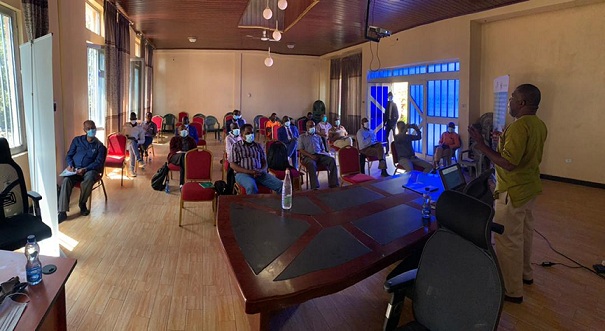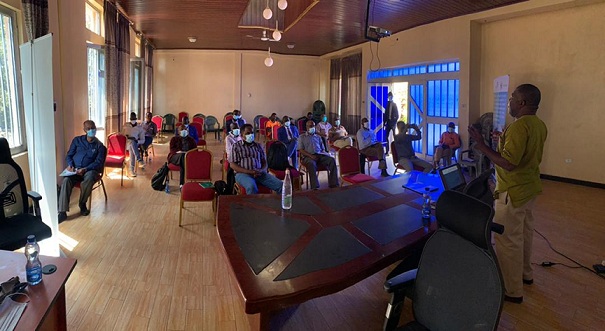3 February 2021 (JINKA, Ethiopia) : The Intergovernmental Authority on Development (IGAD) in collaboration with the Fisheries Directorate of the Ministry of Agriculture of Ethiopia yesterday inaugurated two national level workshops in Jinka, Ethiopia.
These two inception workshops marked the launching of an IGAD project aimed at supporting sustainable utilisation, development and Management of two transboundary basin fisheries: the Baro-Akobo-Sobat River Basin (BASRB) between Ethiopia and South Sudan, and the Lake Turkana Basin (LTB) shared between Ethiopia and Kenya.

Participants are drawn from the Ethiopian Federal Government, Regional Governments, Zones and Woredas, Fisheries representative, and development partners representatives.
The overall objective of this three-year project, which is part of an European Union funded wider programme called ECOFISH, is to develop a gender-responsive and climate-smart sustainable utilisation of fisheries resources, and foster use of fisheries for building of resilience and bolstering of food and nutrition security and local economies especially for the fishing and “Arid and Semi-Arid Lands (ASALs)” communities in the two basins. This includes provision of support to the fishing communities and fisheries managers in each of the two basins to facilitate their active participation and engagement in fisheries management.
‘Considering the huge potential of fisheries along the cross border areas, knowledge based utilisation and management, including sustaining of food safety standards of the products, are of paramount importance’, said Dr Eshete Dejene – Programme Manager for Environment Protection at IGAD Agriculture & Environment Division, as he was speaking for IGAD Executive Secretary.
He continued that during the workshops, participants ‘will update the baseline report, and adopt the fisheries co-management plans which were validated a year and a half ago. ‘Your critical inputs are expected to improve the documents’, he concluded
For Dr Hussein Abegaz Issa, Director of Fishery Development Directorate at the Ministry of Agriculture and Livestock of Ethiopia, fisheries management in shared waters is a must since the fish migrate and move across borders for reproduction. ‘If the fish is poorly managed in one country, it will automatically affect the other country’, he said before continuing that ‘this pilot project will serve as a lesson how to manage cross border natural resources’.
The two workshops on the two basins will:
- introduce the project to national stakeholders;
- review the baseline reports and fill the information gaps;
- review the co-management reports; and
- review the Project’s plan based on the prevailing COVID situation.
This is meant to provide a framework for harnessing the fisheries potential and to foster sustainable utilisation and exploitation of the fisheries for improving the livelihoods, food security and nutrition, and incomes of members of the communities in Arid and Semi-Arid Lands (ASALs) that these three rivers traverse. There is already a draft co-management plan drafted and adopted by IGAD member states with the support of the African Development Bank in 2019. These draft fisheries co-management plans will be improved during the workshops and implemented in the Lake Turkana and River Omo basin between Ethiopia and Kenya and on Baro/Akobo/sobat river basin (between Ethiopia and South Sudan).
Background
The “Contribution of Sustainable Fisheries to the Blue Economy of Eastern Africa, Southern Africa and the Indian Ocean region (ES-SA-IO) – “Ecofish” is financed by the 11th EDF Cross-Regional Initiative.
The ECOFISH programme is managed by the European Delegation in Mauritius and implemented by the Indian Ocean Commission Secretariat in collaboration with the sub-regional implementing partners, namely:
- the five Dully Mandated Organization COMESA, EAC, IGAD, IOC and SADC;
- the five Regional Fisheries Management Organizations and Regional Fisheries;Bodies (IOTC, LTA, LVFO, SOIFA and SWIOFC); and
- other development partners such as AU IBAR, WBG and EFCA.
The overall objective of the ECOFISH programme is “to enhance equitable economic growth by promoting sustainable fisheries in the EA-SA-IO region”.
The specific objective is “to support sustainable management and development of fisheries in order to contribute to poverty alleviation, food and nutrition security while addressing climate change resilience and enhancing marine biodiversity
From the overall ECOFISH Programme, IGAD got a grant through a Call for Proposal under one of the result area/thematic area: concrete fisheries management and governance initiatives in small scale, inland and marine fisheries
The IGAD component titled “Enhancing Sustainable Utilization, Development and Management of Two Transboundary River Basins Fisheries in IGAD Region” and for which IGAD signed a 3 years grant contract in June 2020 with EUD Mauritius with a total budget of 967 215.00 Euro is implemented by IGAD Secretariat.
- a) support the implementation of the Integrated Fisheries Management Plans (IFMP) already developed for two Transboundary Fisheries Resources of BASRB and OTRB; b) enhance the role of women and youth in fisheries;
- c) increase the value of produced fish through improved marketing system and adoption of better processing and preservation technologies; and
- d) ensure that the IMFP take in to account four specific objectives of Ecosystem Approach (biological, ecological, economic and social specific objectives).

